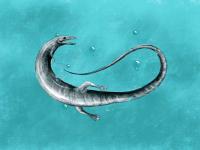170-Million Year Old Jawbone of Dog-Sized Crocodile Found Isle of Skye

A new discovery of fossil has been added to the paleontologists’ knowledge graph by a team from the University of Edinburgh that found a rare 170 million-year-old jawbone.
Interestingly, the tiny bone is from 30-year old dog-sized crocodile-like creature spotted at Isle of Skye, Scotland. Scientists have made some X-ray scans to examine the previously found fossil. While measuring the bone of 3.5cm length found at Duntulm Castle in the north of the island, they have solved several mysteries.
Resulting in the observations, researchers noted that the jawbone is from a crocodile relative. They also believe that neosuchians named creatures were being diverse at the time on shores.
Dialy Mail reported that Dr. Steve Brusatte from the School of GeoSciences of the University has told the website that they have earlier discovered the pieces of the crocodile on Skye, but the recent one is nicer. It is a nearly complete jawbone.
Paleontologists are assuming that this small dog-sized creature was of the time of dinosaurs living in the lagoons of ancient Skye.
Dr. Brusatte further added: “These were very ancient, very primitive relatives of today’s crocodiles. They would have looked more like scaly dogs than big scary alligators. One reason why the new fossil is so important is because it is one of the few crocodile fossils from the middle part of the Jurassic Period from anywhere in the world.”
“Skye is a unique window into the Middle Jurassic, as it is one of the few places globally that preserves fossils from this time.”
He explained: “There are some relatives in North America, Asia, and other parts of Europe, but from later in time.”
“If we had better fossils of Middle Jurassic from other parts of the world, we would probably find more of these small crocs. But Skye is one of the only games in town for Middle Jurassic fossils,” he added.
The Isle of Skye is one of the few places in the world where fossils from the Middle Jurassic Period can be found. In 2008, scientists revealed that the earliest turtles that were known to live in water had been discovered on the same island.
Fossils of the 164 million-year-old reptiles were found on a beach on the Strathaird peninsula in the south of the island. The discovery formed a missing link between ancient terrestrial turtles and their modern, aquatic descendants.
Experts say that Skye was covered in lagoons and filled with turtles, crocodiles, pterosaurs and dinosaurs during the Middle Jurassic period.
Recently, geologists got hold of an ‘alien’ mineral while exploring the volcanic rocks of the Skye. They believe that meteorite might have hit our Earth almost 60 million years ago. At first, the researchers thought that the rocks are nothing but volcanic flow deposits called ignimbrite. But when they examined the rock deeply, they found out that rare meteoritic minerals were present beneath a 60million year lava flow that had originated from an ancient volcanic eruption.
Source: www.tecake.in








